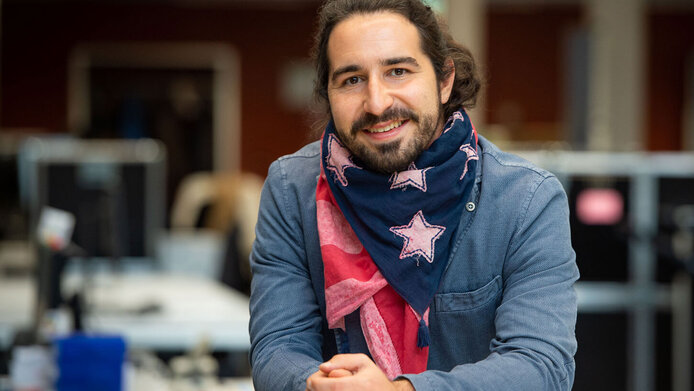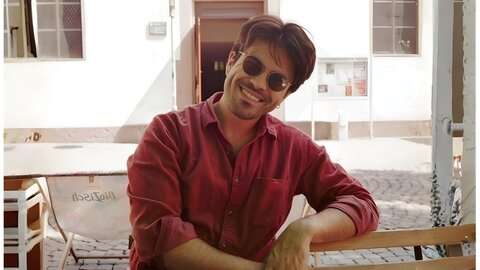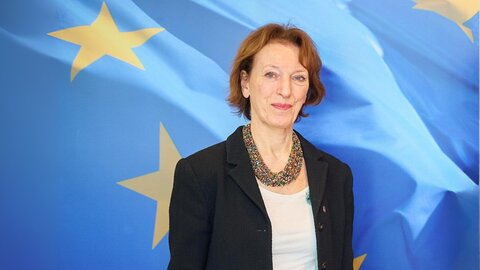Building a bridge to the quantum world

Mr. Küng, everyone is talking about quantum computers, calling them the next revolution in tech. What could such systems be used for?
Richard Küng: The things quantum computers will be able to do better than traditional computers won’t be everyday work areas: In laptops, trillions of computational operations take place per second – with quantum computers, the technical noise produced by even around ten thousand operations would destroy any signals. Where I do see real potential, however, is in artificial intelligence, where we have been able to show that quantum entanglement can help reduce training times considerably. Bur first we need to make data from the quantum world accessible to machine learning – and for this, we will need to lift information from the quantum to the microscopic world.
This involves fundamental difficulties, which you compare with Plato’s Allegory of the Cave. Can you explain that a little bit?
Küng: Quantum systems, especially when composed of many qubits, are complex, high-dimensional objects. But we humans can only perceive low-dimensional, poorly resolved schemas of these systems, just like the prisoners in Plato's parable – all they see of the three-dimensional world are the shadows on the cave wall.
But in order to be able to read out the qubits processed by quantum algorithms, this is just what needs to happen, right? Identifying objects by their shadows. What problems does this pose?
Küng: In order to convert the results of quantum computing into a form that can be used by other computers, I need to take measurements of the qubits. But that causes the quantum properties to disappear, or as experts say: The wave function collapses. The information is also not stored in a single system, but in the relationships of multiple qubits, so the quantum algorithm needs to run multiple times. This is extremely time-consuming, and also takes exponentially many bits to get a readout of the information. This isn’t an issue for the small quantum computers we currently have, but for larger computers in the future, we won’t be able to afford the necessary bit resources.
You have been awarded the 2023 START Award for your idea to overcome this challenge, known as the readout problem. What is your approach?
Küng: Instead of measuring the quantum systems one after the other as we have until now, I would like to use entanglement to help parallelize these processes. This holds enormous potential, as we were able to demonstrate in a pilot project with Google.It allows us to gain more direct access to the quantum world and conserve our resources.
First the award, then the research: What are your next steps?
Küng: As a theorist, I don't need to set up a lab, so as a first step I will expand my team of PhD students, and together with them we will first address the readout problem. That means the award money will primarily go towards personnel costs and travel expenses, because international exchange is very important to me, including with our project partners at Caltech (California Institute of Technology). As a further step, we want to explore synergies with artificial intelligence, so that we can then implement our concepts on real quantum computers.
You have a very international research career. Why are you pursuing this project in Austria, of all places?
Küng: While I did have the opportunity to collaborate with leading companies and got quite a few job offers in the US, ultimately I believe in basic research and the free availability of knowledge. The FWF and the START Award give me the resources and independence I need to really pursue my project without making compromises.
Richard Küng is an associate professor of quantum computing at Johannes Kepler University Linz (JKU). After his studies at the ETH Zurich and his doctorate at the University of Cologne, he spent several years doing research at the renowned Caltech in California before completing his habilitation at JKU. Küng works on efficient and simple solutions to information processing problems with traditional and quantum computers. He has received numerous awards for his research, including the Willi Studer Prize from ETH Zurich and the Cardinal Innitzer Prize from the Archdiocese of Vienna.
About the project
Quantum computers’ greatest advantage is also their main weakness: These systems work with information carriers based on the superposition effects of quantum physics, so-called qubits. But data processed in this way cannot be easily converted into a format readable by normal computers – or by humans. In the START Award-winning project “Q-Shadows,” Richard Küng wants to use quantum information theory itself to fundamentally solve this readout problem, saving time and bit resources in the process. Building on this, artificial intelligences will learn to navigate the quantum world. Küng eventually wants to put his ideas into practice with future quantum computers.
The FWF START Award
The START program of the Austrian Science Fund (FWF) is aimed at outstanding young researchers, giving them the opportunity to plan their research in the long term and with a high degree of financial security. It is endowed with up to €1.2 million and is one of Austria’s most prestigious and most highly endowed awards alongside the FWF Wittgenstein Award.





